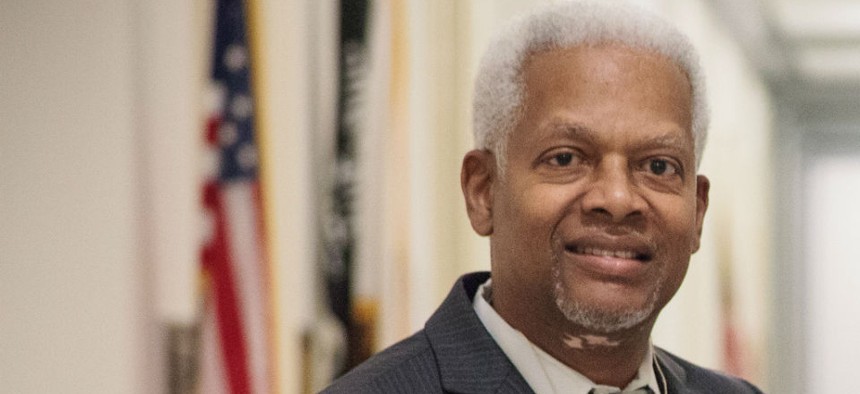
Rep. Hank Johnson, D-Ga. Flickr user Church World Service
Congressman's Push to Curb Police Militarization Gets Big Boost After Ferguson
Georgia Democrat for months had been shopping around legislation to boost accountability and limit the kind of military equipment that local police departments can acquire.
Rep. Hank Johnson didn't like the Pentagon's surplus military transfer program long before Ferguson, Missouri, turned into a war zone.
The Georgia Democrat, a member of the House Armed Services Committee, for months had been shopping around legislation to boost accountability and limit the kind of military equipment that local police departments could acquire, for free, from the Department of Defense.
Support for the proposal was "lively," Johnson said, but he hadn't gotten to the point where he was ready to formally introduce it.
Then 18-year-old Michael Brown was shot and killed, and the police department in that small town northwest of St. Louis transformed itself into an army preparing for an invasion. Scenes of police officers in full body armor, carrying machine guns and lobbing canisters of tear gas into crowds of protesters filled television and computer screens.
If the old saw is true that a picture is worth 1,000 words, Johnson told The Wire on Friday, then "a video is probably worth 10,000 words or more."
In his case, the images may be worth a bucket of votes in the House.
"Momentum has been building," Johnson said, and he plans on unveiling his proposal when Congress returns in September from its summer recess.
He hopes to have bipartisan support, and his office has been in talks with aides to Rep. Raul Labrador (R-Idaho), a prominent conservative. Johnson's bill has also drawn interest from Sen. Rand Paul (R-Ky.), the likely candidate for the Republican 2016 presidential nomination who decried the "increasing militarization of the police" in a Time.com op/ed Thursday.
Its supporters also include Rep. John Conyers (Mich.), the top Democrat on the House Judiciary Committee, and Rep. Raul Grijalva (D-Ariz.), co-chairman of the Congressional Progressive Caucus, aides said.
Congress created what has become known as the 1033 program in 1990 to save taxpayers money and ensure that surplus military equipment did not go to waste. Police departments had become fearful of violent clashes with drug gangs, and intervening events like the Los Angeles uprising that followed the police beating of Rodney King, led to calls to beef up local police departments to avoid having to call in the military to put down riots.
More recently, the winding down of the wars in Iraq and Afghanistan has created an even greater surplus of military equipment. The program has transferred a total of $5.1 billion in equipment to more than 8,000 local enforcement agencies since its inception, including nearly $500 million in 2013 alone, according to the military's Law Enforcement Support Office.
Yet questions about its efficacy have persisted. An investigation by the Associated Press last year found that a large portion of the transfers went to departments "in rural areas with little crime."
Part of Johnson's issue with the program is that police departments can apply for the equipment without input from their local city council or elected officials, limiting political accountability. "That's not good for our democracy," he said.
As currently drafted, Johnson's bill would prohibit the transfer from the military to local law enforcement agencies certain automatic weapons, drones, aircraft, silencers, and armored vehicles. It also would require police departments to certify their officers have the capacity and training to use the equipment, and it would create requirements to certify that departments haven't lost equipment they already received from the Pentagon.
Even with the galvanizing events in Ferguson, Johnson's proposal has a long way to go. When liberal Rep. Alan Grayson (D-Fla.) called for a vote on his amendment to limit the equipment eligible for the program, just 62 out 435 members of the House supported it.
And despite the political sensitivities surrounding the police activities in Ferguson, defenders of the program are quickly mobilizing in Congress.
"The program saves taxpayers a lot of money," said a Capitol Hill staffer familiar with – and clearly sympathetic to – the 1033 program. "Let's be careful about not throwing the baby out with the bathwater."
Calling the program "benign," the aide pointed out that just 5 percent of the equipment transfers were weapons and just 0.035 percent were armored vehicles.
Democratic leaders in the Senate are also beginning to take a closer look at the military transfer program.
The chairman of the Armed Services Committee, Sen. Carl Levin (D-Mich.), on Friday said his panel would "review" the program when the annual Defense Department reauthorization bill comes up later this year:
Congress established this program out of real concern that local law enforcement agencies were literally outgunned by drug criminals. We intended this equipment to keep police officers and their communities safe from heavily armed drug gangs and terrorist incidents. Before the defense authorization bill comes to the Senate floor, we will review this program to determine if equipment provided by the Defense Department is being used as intended."
(Image via Flickr user Church World Service)






